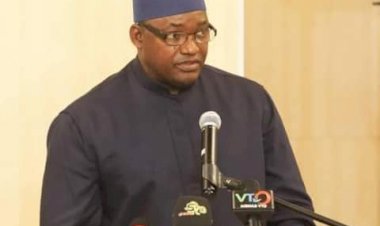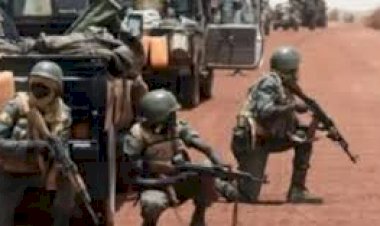“The crisis in Mali is also a sign of the failure of decades of international intervention

A political science teacher at the Université libre de Bruxelles (ULB), Isaline Bergamaschi has worked at length on official development assistance in Mali. In an article published in 2014, “The fall of a darling of development aid agencies, the role of international cooperation in the Malian crisis” (The Journal of Modern African studies, Cambridge University Press), she showed how international funding on which Mali depends, together with public policy recommendations, had contributed to the context of fragility leading to the overthrow of President Amadou Toumani Touré (ATT) in 2012.
Eight years later, while foreign intervention has increased to respond to the humanitarian crisis and fight terrorism, the questions posed by the de facto supervision of the Malian state have, according to her, not exchange. For the researcher, the putsch of August 18 which led to the fall of President Ibrahim Boubacar Keïta should lead the international community to question the modalities of its intervention if not its relevance.
Are you doing the same analysis today as for the 2012 crisis to explain the rejection of Ibrahim Boukakar Keïta (IBK)?
Isaline Bergamaschi The international intervention in Mali began long before the French military operation that began in 2013. The country has a long tradition of dependence on international aid which leads to the co-production of public policies by foreign and national actors. This dependence is visible and keenly felt when, on the occasion of a coup d’état, part of international cooperation is suspended: the capital Bamako and the economy slow down.
During the 2012 crisis, these donors emerged as the sponsors, voluntary or otherwise, of the ATT regime, despite all the contestation and disappointment it aroused. The poor management of the crisis in the north of the country, poor governance, increased corruption, economic reforms pushed by the World Bank such as the privatization of the Malian Textile Development Company (CMDT) or the support of certain embassies or agencies for cooperation with the Family Code reform project are all subjects which, at the time, had crystallized discontent. Donors have remained deaf to this mounting anger, considering that despite all the imperfections of the system, it is best to try to build the capacity of the Malian state.
Read also In Mali, the M5-RFP willing to “support” the junta in the transition process
But eight years later, it is the same causes that have pushed the population into the streets in a very degraded security context. The practices denounced under ATT continued under IBK. The crisis that Mali is going through is not only a crisis of the Malian state or of the bankruptcy of its political class since democratization in 1992. It also marks the failure of decades of international intervention through the promotion of an extroverted model of development in which international actors end up being part of the State with all the ambiguities that this can generate. Today, its questioning in the discourse of the opposition and of the social and political forces favorable to the coup d’état is more central than in 2012.
What are the problems with this model?
The fact that all public policies are produced with international actors poses a problem of democracy since people who are not elected and have no responsibility vis-à-vis Malian citizens are involved in all ministries. Everywhere there are foreign experts and technical assistants paid by European governments and it is all very “routine”.
Read also “This country is mine, this country is yours”: the Malian diaspora expresses itself on the transition in Bamako
At the same time, a significant part of the aid goes directly through projects which are not managed by national institutions, which often poses problems of articulation, duplication, but also sustainability, because they are not fully integrated into the projects. public policies. The priorities and procedures of the projects are those of the international agencies. This situation has worsened since 2012, as international actors have invested heavily in the humanitarian and security field.
At the same time, you point out the difficulties in tracking the use of this money …
It is increasingly difficult to follow the financial flows linked to international interventions in Mali, because they involve more and more different actors with different logics and modalities of intervention. The donors themselves find it difficult to have a clear vision. All these actors talk about coordination all day long, but the reality is a great fragmentation and opacity.
Read also Return to Kati, garrison town and “factory for putschists” in Mali
On the other hand, Malian public actors have for decades developed strategies to “appropriate” this aid and to adapt to it by not implementing the reforms imposed on them, by diverting funds to others. targets or other purposes… It does not facilitate an assessment.
Should donors reconsider their modalities of intervention in Mali?
Previous failures have been interpreted as a sign of insufficient commitment from donors and justify new, increasingly complex and diverse interventions. IBK’s arrival coincides with the promise of an increased financial effort from the international community for development and the fight against poverty. The reflex is therefore always to say that we must do more, give more money instead of questioning the merits of the policies funded by this aid. Should we give more support to a civil society that emerges when the state is deficient? Should we promote growth policies or continue to invest in the social sectors? Support the north more than the south?
Read also “In Mali, France is still in denial in the face of Sahelian realities”
The Malian failure invites us to question the capacity of the international community to build a state from the outside rather than continue in this headlong rush. Development aid is used by Western countries and multilateral organizations to maintain ties, including dependency, with a country like Mali. It creates jobs and markets in Mali and in donor countries. But, in the absence of a far-reaching reform of the rules of the international economic game, it has served little to engender development in these countries or to strengthen the relationship between the state and its citizens.
Laurence Carame

















































